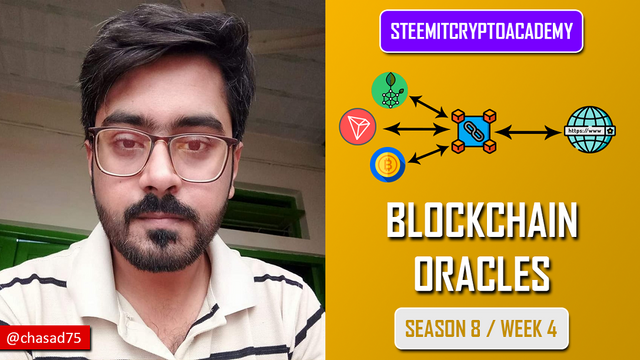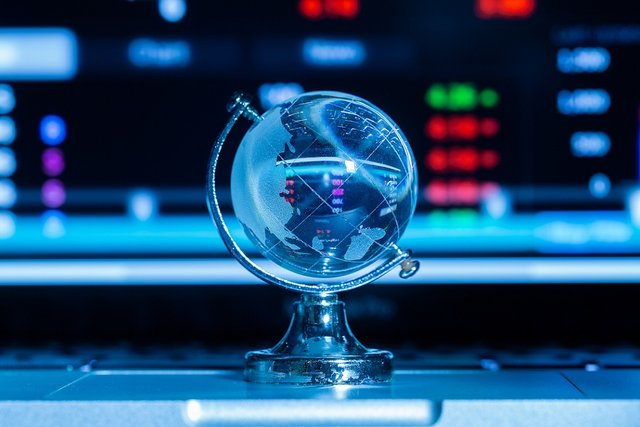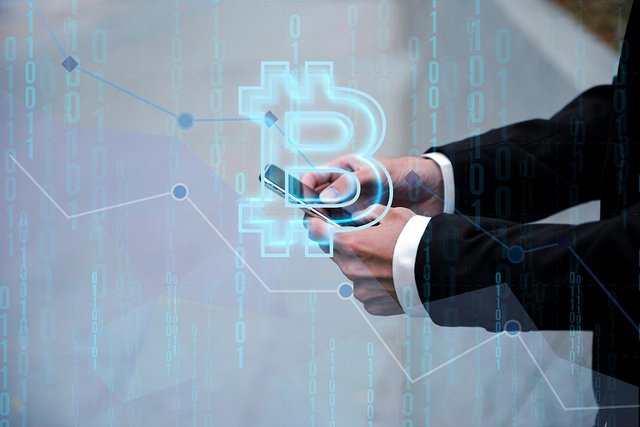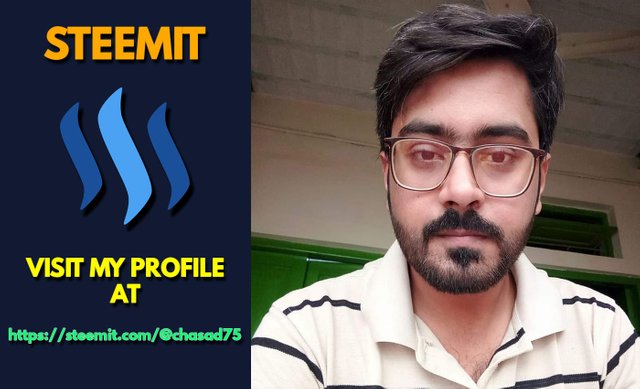Steemit Crypto Academy Contest / S8W4 - Blockchain Oracles
Greetings To All |
|---|
Hi, This is Asad Fazal from Pakistan. I hope everyone here is fine and enjoying their life to full. Today I'm here to take part in the Season 8 Week 4 contest held in SteemitCryptoAcademy. The topic decided by the team is Blockchain Oracles. Blockchain is one of my favorite topic but I am reading Blockchain Oracles for the first time. This is the thing that I love about SteemitCryptoAcademy that they introduce new topics so that users learn about blockchain. So now without any further ado, let's get straight to the topic!

Do you know what Blockchain Oracles are? We want to know your opinion. |
|---|
A blockchain oracle is a third party service that helps in connecting blockchains to external outside world. It is like a bridge that let feed the information in from the world and also to the real world. To access the data outside the on-chain/smart contracts, there was no intermediate for this but now with the help of blockchain oracle, blockchains and smart contracts can access data of real world.
Let's make it even more simple. For some contracts/agreements in blockchain, it is important to have relevant information from outside world but there is no medium to link outside world with blockchain. For this, blockchain oracles play important role by connecting off-chain and on-chain data. If there is no blockchain oracles, then smart contracts will have limited usage that will be inside the network only.
Let's take example of Alice and Bob who bet in car race or any other race. The total of $100 is escrow by smart contract that includes $40 of Alice on Team A and $60 of Bob on Team B. But here the thing is how does a smart contract knows when the game will be over, to whom he needs to give money Alice or Bob. So here blockchain oracle is required that will match offchain outcomes and will deliver it to blockchain and then transfer the money to winner.

Currently the Chainlink is working as an industry standard for decentralized oracles. So what is Chainlink? It is a decentralized oracle network that create a bridge between on-chain and off-chain data mean it let smart contracts get the information of real world and vice versa.
Not only chainlink but there are many other decentralized blockchain oracles including Paralink, Dos.Network, Witnet, and Provable.
What are the types of Oracles? |
|---|
Blockchain oracles help in connecting outside world with blockchain and smart contracts. They let access outside data in a closed blockchain network. The data accessed is first queried then verified and then authenticate. After that verified data is used to validate the smart contracts. There are many types of oracles, I will explain them one by one.
1. Software and Hardware Oracles
As we know oracles get data from real world, the software oracles delivers data from the online soft sources like websites, PDFs, databases and data on servers. In hardware oracles, the data gets from real physical world for example the data of sensors and RFID chips. The data that we get from different exchanges like stock, forex, and crypto are deliveried by software oracles.
2. Centralized and Decentralized Oracles
Just like difference between centralized and decentralized exchanges, oracles are also the same. In centralized oracles, data is managed by a single entity that makes it highly risky and open to attack. On the other hand, decentralized oracles are not managed by single entity but rely on multiple source of information or entities so that the information can be validated easily and there must not be any risk involved.
3. Inbound and Outbound Oracles
Most of the communications are two ways like data can go out and come in. In this type of oracle, the inbound oracles is to deliver data from outside world to the blockchain or smart contracts. On the other hand, outbound oracles let delivering of data from blockchain or smart contracts to outside world.

4. Human Oracles
Human can also act as oracle like if he has specialized knowledge in a sector, he can collect data of it, check it's legimacy, and then convert it smart contracts. In this type of oracle, there are very small risk of fraudalent activity because the human who is converting the data to smart contracts needs to verify his identity first.
5. Computation Oracles
This type of oracles is used to perform the impossible calculation on the blockchain or smart contracts. By taking inputs it generates outcomes after calculating it.
6. Contract-specific Oracles
From the name, it tells that this type of oracle is used for specific/single smart contract. If it is needed to deloy multiple smart contracts, one has to develop equal amount of contract-specific oracles. These type of oracles are not used widely because they waste a lot of time and efforts and are used only when no other option is available.
What do you think about decentralized Oracles? |
|---|
In start, the oracle mechanism was managed by single entity that made it centralized in nature. The entity delivers the data to smart contracts but it was a failure due to high risk involved and open to hacking and scamming. It also destroyed the whole concept of decentralization of blockchain.
If the single entity or node goes offline for some reasons, all work stops because smart contracts will have no access to the required data and the contractual agreements cannot be executed. Moreover, if that single entity gets corrupted, it will send wrong corrupted data to smart contracts which in result will give unexpected wrong outcomes. This makes the centralized oracles not fit to blockchain and smart contracts.

On the other hand, to cope with the centralization issues, decentralized oracles were introduced. In decentralized oracles, there is not a single node or entity but there are hundreds or even thousands of nodes that result in less manipulation, lowest risk, almost no downtime, and accuracy in outcomes.
Furthermore, the decentralized oracles also help in authenticating the information to high accuracy. How the information stays so accurate is because it uses ShellingCoin mechanism in which all nodes or entities will send data without connecting to each other. These oracles are much faster and reliable than centralized oracles.
Decentralized oracles are best in nature for large businesses but one thing is must to remember that is they require high budget for infrastructure because multiple nodes or entities are required to achieve consensus in order to create smart contracts. In conclusion, decentralized oracles are much better than centralized oracles in terms of functionality, usage, and benefits.
Give us a use case of a decentralized Oracle. |
|---|
Decentralized Oracles plays a vital role in the form of bridge between the smart contracts and real world. It is becoming more popular and common in the cryptocurrency world. These oracles has changed and is changing the world of blockchain-related industries. There are many use cases of decentralized oracles, let me share few of them here.
1. Insurance
In insurance, there is a transparency problem. One party has more information than other party and anyone of them can advantage of other. The insurance taker (customer) has complete knowledge and information about his assets and products but on the other hand, insurance company has little knowledge on it. The customer wants that insurance company must approve all payments claims and this process is very slow and not transparent.
The solution is decentralized oracle will gather data through API and will send it to blockchain. Then the blockchain with smart contracts and oracles will verify that information is correct and that event occurred or not. It can only be done with blockchain consensus. So with blockchain oracle, transparency can be provided to both parties insurance company and customer.

2. DeFi
Almost all DeFi ecosystems needs financial data of markets and assets. The oracle here do calculation of a customer's borrow capacity and collateralization level. Here the example of DeFi is AAVE project that uses oracles to access price of different assets that they can use in their smart contracts. Moreover, the Synthetic Asset platforms use the decentralized oracles to peg their token value to real-world asset.
3. NFT
Another use case of decentralized oracles is Non-Fungible Tokens (NFT) in which the NFT items can change their value, appearance, and distribution. In this use case, the compute oracle type is used to generate verifiable randomness of NFT and to distribute the traits of NFT randomly. It also let select the winner of NFT.
The example of such use case is Aavegotchi that is a DeFi collectibles game in which users are allowed to stake their NFT avatars and go into Aavegotchi metaverse. There they can increase the value of their NFT by farming rarity inside the game. The solution provided here is by Chainlink Verifiable Randomness Function (VRF) that allow secure on-chain randomness which then can be verified by the users independently.
There are tens of use cases of decentralized oracles that you can have a look at here Chainlink.
Conclusion |
|---|
In last, I must say that blockchain oracles are very useful in connecting the smart contracts and blockchain with the real world. It creates a bridge between them to increase transparency and the work flow. It also allows the users to send the real world data to blockchain and then execute smart contracts on them as per the data. It is important to implement blockchain oracles in different businesses and industries in a secure and reliable way so that it helps the network and ecosystem grow.

This is all from me for the "Steemit Crypto Academy Contest / S8W4 - Blockchain Oracles". I invite @samminator, @malikusman1, @steemdoctor1, @simonnwigwe, @preye2, @lavanyalakshman, and @theentertainer to participate in this contest and share what they know about blockchain oracles.
Thank You For Reading


This is a very good explanation, you explain everything that is needed.
Keep on the good work
Thank you @ekemini5 :)
Thank you, friend!


I'm @steem.history, who is steem witness.
Thank you for witnessvoting for me.
please click it!
(Go to https://steemit.com/~witnesses and type fbslo at the bottom of the page)
The weight is reduced because of the lack of Voting Power. If you vote for me as a witness, you can get my little vote.
I found your explanation of blockchain oracles and their importance in connecting off-chain and on-chain data quite informative. The example you gave of Alice and Bob betting in a race and the need for a blockchain oracle to determine the winner was a great way to simplify the concept for those who might be new to blockchain.
I also appreciate that you touched on the different types of oracles, including software and hardware oracles, centralized and decentralized oracles, inbound and outbound oracles, human oracles, computation oracles, and contract-specific oracles. This gives a well-rounded understanding of the different ways oracles can be used.
Your point about the failure of centralized oracle mechanisms due to high risk and being open to hacking and scamming is a valid one. I agree that decentralized oracles are the way to go, as they rely on multiple sources of information and are less prone to fraud or errors.
Great job on explaining blockchain oracles and their importance in the world of blockchain technology. I look forward to reading more from you in the future!
Thank you brother for your precious comment. I like how you read my complete article and share your view on what I mentioned in the article. I wish you also best of luck for the contest :)
Hey @chasad75 I just read your post on blockchain oracles for the Steemit Crypto Academy contest and I really enjoyed it! You did a great job explaining what a blockchain oracle is and why it matters without getting too technical or overwhelming. I appreciate that you took the time to break down the different types of oracles and your examples of how they're used in real life were super helpful .
What I liked most about your post is that you made the topic relatable & interesting . You didn't just list out facts & figures but you showed us why blockchain oracles are important and how they can make a difference in The world. It's clear that you're passionate about this subject and that really came through in your writing.
Thank you @hamzayousafzai brother.
I always try to do proper research before writing a publication and this topic was not in my memory because I read it first time in the contest. But I did proper research first to present it here in the contest. Thank you for your valuable comment. Please also take part in this contest :)
Dear brother @chasad75 thanks alot for taking part in the contest and i completely read your blog.You write each thing in very simple way about blockchain oracles and i get soo much knowledge from your post about blockchain oracles.You are right my brother blockchain oracles are the bridge between smart contracts and real world because they provide information from outside.You explained the types of blockchain oracles very clear and also give the example of blockchain oracles.As you mentioned very well about the use case of oracles and thanks for explaining the decentralized oracles.Overall you explained all these things about blockchain oracles very well and clear and thanks alot for this amazing article ❤️
Thank you @azmat545 brother for your valuable comment. I appreciate that you read my complete publication and share your view. I also wish you best of luck for the contest :)
Content free from Chatgpt
Sources for my research are:
https://cointelegraph.com/blockchain-for-beginners/what-is-a-blockchain-oracle-and-how-does-it-work
https://academy.binance.com/en/articles/blockchain-oracles-explained
Hi @chasad75,
Good to say that every information provided on this topic was informative... Ranging feom the types of Blockchain oracles, to say that none was left unattended to would be the height of understatement.
Keep it up
Thank you @cinnymartins,
I always try to make my publications perfect but still they left some points missed. I know nothing can be perfect but still we can try. I am thankful that you appreciate for my efforts. This makes me motivated to do more and more in the future. Thank You :)
This is a very good article dear friend. Your explanations of what blockchain oracle is seem to be very simple and understanding. With the help of the example you stated. That’s the car racing the two individuals were playing. You made it clear that in order for the blockchain to be able to know the winner in order to award them. The blockchain oracle must take data off-chain that from outside world to know how much each placed and the total amount of money there. Also it has to know who to give the money to after they are done playing and there is a winner. Indeed this is a very understandable example. Good luck buddy
Thank you my dear friend for your precious comment. Yes blockchain oracle is very useful and it is like a bridge that links outside world data to blockchain or smart contracts that helps to make helpful decisions in the blockchain world.
Great post @chasad75 about the wonderful world of decentralized oracles! It's amazing to see how these oracles bridge the gap between our digital and physical worlds, connecting real-world information and data with our blockchains. With these oracles, businesses can now benefit from the speed, accuracy, transparency, reliability, security, and trust that are essential components of blockchain technology.
I'm inspired by all the incredible use cases for dOracles that you have outlined! From powering insurance and DeFi applications to generating verifiable randomness for NFTs, there is truly no limit to what we can do with these oracles. Chainlink VRF is a particularly impressive solution as it allows us to incorporate secure on-chain randomness into our projects.
I'm absolutely in awe at the possibilities of blockchain technology and am looking forward to seeing how oracles continue to shape our world! Thanks so much for giving us an overview of this important concept.
Thank you @fabiha for reading my article with full attention and leaving a valuable comment. It really matters a lot for me because it keeps me motivated to do more and more. Thank you :)